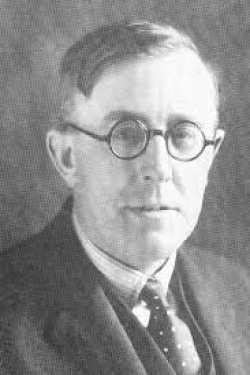Frank Elgee

Frank Elgee, image courtesy of Cleveland Naturalists Field Club
- Born
- 8 November 1880
- Died
- 7 August 1944 (age 63)
Frank Elgee battled against disabling illness and a poor background to publish the first regional survey in Britain.
Elgee was born to a poor family in North Ormesby in 1880 and his mother taught him to read and write. In 1887, he went to the North Ormesby Board School where he caught scarlet fever. This left him short sighted and partially deaf. In 1892, he caught pneumonia which left him with an empyema making him very weak. He had to use a bath chair to get around for the next seven years.
He started work as an office boy at the local iron merchants but poor health forced him to give up his job. In 1897, after surgery on his chest from which he was not expected to survive, his father carried him home to die. Elgee had a strong will to live and his parents arranged for him to have three months convalescing in the countryside of the North York Moors to recuperate.
It was here, from his wheelchair, that he saw the moorlands, escarpments and wildlife, and he resolved to study the area that had first ignited his interest. He met the local vicar who got him interested in natural history and on his return to Middlesbrough he joined the Cleveland Naturalist Field Club. During his convalescence he taught himself Latin, French and German, and studied botany, conchology, geology and astronomy.
His labours were Herculean; his physical strength was nothing more than frailty; and his monetary resources were always meagre. All his work was his true vocation; it sprang from his head and his heart, unconditioned by any thought of worldly gain or bodily ease.
Harriet Elgee, First Portfolio of the Cleveland Naturalists Club, published December 1948
Elgee had little money but planned out his work carefully so that he could cover the 400 square miles of the North York Moors. Most of his excursions were on foot but after he won a half-a-crown prize from a local newspaper for a scientific article, he used the money to pay for bus and train fares, and accommodation at remote moorland farms.
In 1907 he began to write The Moorlands of North-East Yorkshire. It was the first book in England to deal with the moors from a scientific viewpoint and to consider them holistically, encompassing botany, zoology and geology. Elgee focused on how the moors had been created, and the interaction and interdependence between the animals, plants and geological history. The book, the first regional survey of Britain, was published in 1912 and was almost half a century ahead of similar books.
Elgee then wrote a number of books on the archaeology of the region, possibly inspired by the vast burial mounds he had discovered during his travels. He was assistant curator and then curator of the Dorman Museum in Middlesbrough (with a focus on natural history) from 1904 until ill health forced him to retire in 1933. In the same year, Leeds University gave him an honorary Doctor of Philosophy degree in recognition of his work.



